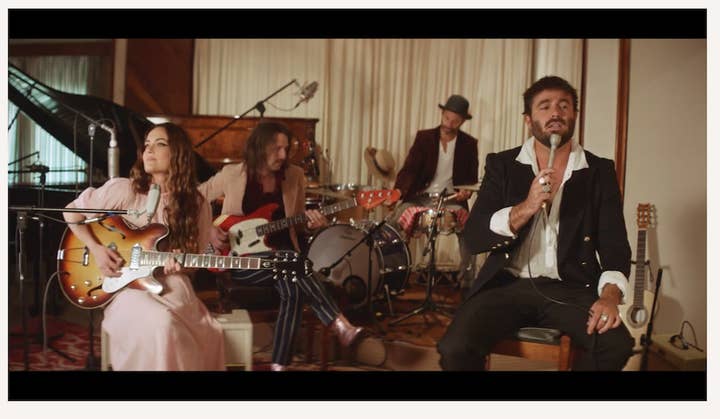Elevating the way video game companies work with music
Ben Sumner shares seven key things that can be done to improve the way music is integrated in games
Branding through music is key to any project and is always one of the biggest cultural positioning tools for any producer or marketer -- gaming or otherwise.
Look at FIFA and GTA and how they have made music core elements of their products and marketing. Think about the music from Halo or Rocket League; it doesn't necessarily represent what consumers might listen to for purely musical purposes but you know instantly the cultural space that these brands sit in. The music becomes a key part of any game's identity, shaping the environment, and often driving high levels of long-term recognition.
I'm constantly reminded of how much of an after-thought music can be when the proverbial phone rings with a new client needing a track for an asset they have been planning for 12 months+, that goes live in weeks, and they don't have music locked in.
[Music] is currently underutilized, and a tool that can be better harnessed in games
Music is a lot of things but I believe that it is something that is currently underutilized, and a tool that can be better harnessed in games; more so now than ever.
The music industry is ever more open to the use of music and artists are largely very keen to work in the sector. It is still a very complex landscape of rights that can be difficult to traverse but the rewards are there for those that make the effort.
Here are seven key things that can be done to improve the way games companies work with music.
1. Start at the beginning
Putting music at the end of the chain is a mistake. Choices about the style, tone and genre should be made early on rather than trying to fit specific scenes or trailers. These choices still need to work for specific assets but having a directional guide from the beginning can steer music choices. This way you know the cultural space you want your brand (rather than asset) to sit in and this guides specifics as the project develops.
There is such a broad variety of music available that without narrowing the potential it is actually making the process harder and more prone to error.
Without this early structure there tends to be a lot of individualized decisions about music that are made independently of each other; this can lead to inconsistency in the overall message and leave consumers confused about the identity of a game.
Spending years of time on narrative and level design but leaving the music to the final throws of development will not bring the desired results
Evolution or movement of these early choices has a certain inevitability, much like many other areas of the shifting sands of game development. The point is not to be locked in or limited but to be considered in the approach and give a greater weight to brand strategy through music as early as possible. More practically, this enables good decisions around music to be made internally and by third parties.
Having a plan and strategy that includes budget from the beginning gives the best chance for success and often brings a degree of economy with it. Spending years of time on narrative, characters and level design but leaving the music to the final throws of development will not bring the desired results.
2. Evolve from subjective to objective approach to music
The most common and basic error is to make choices on music based on subjective preference. Sometimes these gut decisions or personal selections can work on individual assets but long-term this does not lead to cohesive music use or development of strong brand identity.
A more objective approach will start with cultural reference points about the space a game will occupy in the market and the core audience that is being targeted. This commonly requires third party objectivity from beyond specific asset creators. At the very least there should be a singular concept from the outset that is defining the sound of that brand, above the common practice of letting different stakeholders manage music choices with no overarching guidance.
The most common and basic error is to make choices on music based on subjective preference
Separating personal taste from music decisions can be quite difficult for many, especially big music fans who feel they are knowledgeable in the space. I think it's something that is important to be aware of and use objective others to sense check choices as much as possible.
Having a strong creative vision is crucial to the success of any project; but this always needs to be tempered with objectivity. A creative lead will have a vision for look and feel but will work with specialists to realize that vision; and those specialists tend to bring with them a more objective approach based on experience.

3. Find a good fit
Objectivity comes in again here, as any game/brand/project must have a good fit with all its key creative pillars. This applies to music as much as it does anything else. Does the artist/song and the game/asset naturally sit well both in a macro and micro way? Working well for that specific need but also fitting in with the wider brand?
Shared audience or at least overlap is essential; at the very least there must be common ground culturally between song and game.
In a global market, perceptions for music can vary widely and good fit is something that must be strongly considered from an audience perspective.
When you get a good fit with an artist and/or song the end result is generally greater than the sum of its parts. The combination gives greater value than it would otherwise. With licensing this would mean greater appeal to both fans of the artist/song and those of the game.
Both groups appreciate the placement more because it feels natural and makes sense. With score, it simply means that the sequence is better, more playable and memorable than it would have been otherwise.
It may sound obvious but all the best music choices will work well in a very natural way, but it does take best practice to consistently find that sweet spot.
4. Do authentic testing on music
Using testing can be valuable but using it to confirm a choice that has already been made is pointless
Play-testing and focus groups for individual track selections are easily led. Using testing can be valuable but using it to confirm a choice that has already been made is pointless. If you are going to test, then give viable options and look for objective feedback.
Also looking at music from an earlier point in the process allows for this to be more meaningful and often just means that it is possible at all due to time constraints.
Even if you can't do external testing, controlled testing internally and/or with already involved partners can be beneficial.
5. Don't scrimp on the music budget
The value with money spent on music can be hard to quantify and make tangible but it is undoubtedly there. Music rights can be expensive so spend your money wisely and have a strategy for how to spend available budget across key needs. An evolved approach to music need not be an expensive one but it is common for it to be somewhat of an afterthought and it is good practice to set aside a sensible proportion of any production budget for music.
Spending a fortune on CGI for a trailer but expecting a bit of game score created for a different purpose to carry it is more common than I would hope, and I think is more often than not a budgetary decision.
What makes score great tends to be subtlety, nuance and ability to engage for long periods with depth. Trailers need to be instant and attention grabbing in a short space of time which leave little room for subtlety.
Music is a key pillar of many games and this should be reflected in the budget set aside for it. You will find most games that have notoriety for their music have from the outset prioritized music from a budgetary perspective (as well as in other ways).
6. Go beyond the score

Obviously, connection between music and the game or trailer is vital, but there is so much more to be had beyond a standard song placement or bit of score work. Look at the partnerships that games such as Fortnite, GTA and Life is Strange have utilized.
Live performance, artists as characters, OST's, BTS content, exclusives, merchandise are all interesting ways of working with music creators that can add bags of value to any game brand.
Often there is a world of possibility here that is limited only by imagination and there is a willingness often on both sides. But that little bit of extra time and effort is needed to find ways of working in a symbiotic way.
7. Consider hiring an independent expert
Objectivity in the music space is surprisingly tricky -- setting aside personal preference and managing preferences of various team members can be very difficult. Then you also have numerous experts who are not independent, they represent composers, owned music rights, and have specific agenda's to push.
Complete objectivity is rare but hiring an independent expert and listening to them is the closest anyone is likely to get.
Ben Sumner is the managing director of Feel For Music, a music consultancy specializing in the gaming and media sectors.